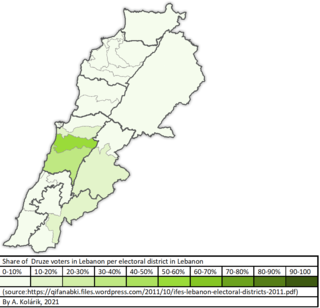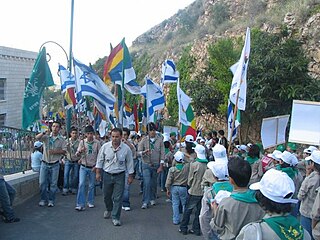
Palestinians or Palestinian people, also referred to as Palestinian Arabs, are an ethnonational group descending from peoples who have inhabited the region of Palestine over the millennia, and who today are culturally and linguistically Arab.

Palestinian Christians are a religious community of the Palestinian people consisting of those who identify as Christians, including those who are cultural Christians in addition to those who actively adhere to Christianity. They are a religious minority within the State of Palestine and within Israel, as well as within the Palestinian diaspora. Applying the broader definition, which groups together individuals with full or partial Palestinian Christian ancestry, the term was applied to an estimated 500,000 people globally in the year 2000. As most Palestinians are Arabs, the overwhelming majority of Palestinian Christians also identify as Arab Christians.
Liberation theology is a theological approach emphasizing the "liberation of the oppressed". It engages in socio-economic analyses, with social concern for the poor and political liberation for oppressed peoples and addresses other forms of perceived inequality.

Munib Younan is a Palestinian Bishop Emeritus of the Evangelical Lutheran Church in Jordan and the Holy Land (ELCJHL).
The Sabeel Ecumenical Liberation Theology Center is a Christian liberation theology organization based in Jerusalem. It was founded by Palestinian Anglican priest, Rev. Naim Ateek, the former Canon of St. George's Cathedral in Jerusalem.
Rifat Odeh Kassis is a Palestinian human rights and political and community activist. He is an author and speaker. He has been arrested and imprisoned several times by Israel.

Naim Stifan Ateek is a Palestinian priest in the Anglican Communion and founder of the Sabeel Ecumenical Liberation Theology Center in Jerusalem. He has been an active leader in the shaping of the Palestinian liberation theology. He was the first to articulate a Palestinian theology of liberation in his book, Justice, and only Justice, a Palestinian Theology of Liberation, published by Orbis in 1989, and based on his dissertation for his degree in theology. The book laid the foundation of a theology that addresses the conflict over Palestine and explores the political as well as the religious, biblical, and theological dimensions. A former Canon of St. George's Cathedral, Jerusalem, he lectures widely both at home and abroad. His book, A Palestinian Christian Cry for Reconciliation, was published by Orbis in 2008, followed by A Palestinian Theology of Liberation, 2017.

Sunni Islam is a major religion in Palestine, being the religion of the majority of the Palestinian population. Muslims comprise 85% of the population of the West Bank, when including Israeli settlers, and 99% of the population of the Gaza Strip. The largest denomination among Palestinian Muslims are Sunnis, comprising 98–99% of the total Muslim population.

Theodosios (Hanna) of Sebastia is the Archbishop of Sebastia from the Greek Orthodox Patriarchate of Jerusalem. Colloquially known as Atallah Hanna, Atallah and Theodosios both meaning "gift of God" in Arabic and Greek, respectively. Theodosios, who was ordained on the 24 December 2005 at the Church of the Holy Sepulchre, is the second Palestinian to hold the position of archbishop in the history of the diocese.

Christianity is the third largest religion in Israel, after Judaism and Islam. At the end of 2022, Christians made up 1.9% of the Israeli population, numbering approximately 185,000. 75.8% of the Christians in Israel are Arab Christians. Christians make up 6.9% of the Arab-Israelis.

Mitri Raheb is a Palestinian Christian, the pastor of the Evangelical Lutheran Christmas Church in Bethlehem, and the founder and president of the Diyar Consortium, a group of Lutheran-based, ecumenically-oriented institutions serving the Bethlehem area.
Musalaha is a faith-based organization that teaches, trains and facilitates reconciliation mainly between Israelis and Palestinians from diverse ethnic and religious backgrounds, and also international groups, based on Biblical principles of reconciliation.
Nur ad-Din Masalha commonly known in English as Nur Masalha is a Palestinian writer, historian, and academic.
Riad Jarjour is a Syrian Christian clergyman who served as General Secretary of the Middle East Council of Churches between 1994 and 2003. He was born in Aleppo and grew up in the city of Homs.
The Jerusalem Declaration on Christian Zionism is a joint statement issued by a number of Palestinian Christian churches dated 22 August 2006. It rejects Christian Zionism, concluding that it is a "false teaching that corrupts the biblical message of love, justice, and reconciliation."

The Lebanese Druze are an ethnoreligious group constituting about 5.2 percent of the population of Lebanon. They follow the Druze faith, which is an esoteric Abrahamic religion originating from the Near East, and self identify as unitarians.

Israeli Druze or Druze Israelis are an ethnoreligious minority among the Arab citizens of Israel.
The Evangelical Lutheran Church in Jordan and the Holy Land (ELCJHL) is a Lutheran denomination that has congregations in Jordan and State of Palestine. First recognized as an autonomous religious community by King Hussein in 1959, the church currently has 2,500 members in six congregations.

Kairos Palestine is an organization primarily known for its issuance in Bethlehem in December 2009 of the Kairos Palestine document, full title of which is "A moment of truth: A word of faith, hope, and love from the heart of Palestinian suffering", a call by a number of Palestinian Christians to Christians around the world to help fight the Israeli occupation. The chief activity of the group is the promotion of this document.









